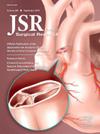胸椎恶性肿瘤合并精神合并症患者手术治疗的范围综述
IF 1.7
3区 医学
Q2 SURGERY
引用次数: 0
摘要
精神合并症越来越多地出现在胸部恶性肿瘤患者中。我们进行了这一范围综述,以描述精神疾病患者胸部恶性肿瘤的治疗特点,并揭示手术治疗或围手术期结果的任何差异。方法:我们按照系统评价和荟萃分析指南的首选报告项目进行了范围评价。2000年1月1日至2024年8月1日期间,在PubMed、Embase和APA PsycInfo中发现了全文英文文章。符合条件的文章包括实验性、准实验性和观察性研究,涉及患有精神疾病、胸部恶性肿瘤和手术干预的成年患者。提取并分析了诊断阶段、基于指南的干预措施和患者健康结果的数据。结果2位审稿人共筛选出5050篇研究,其中235篇符合全文审查标准,31篇纳入数据提取。在纳入的文章中,26篇评估肺癌,7篇评估食管癌。最常见的精神合并症是物质使用障碍(n = 13)、酒精使用障碍(n = 12)、抑郁(n = 11)、焦虑(n = 8)、精神障碍(n = 7)和认知障碍(n = 7)。虽然观察到的差异的性质因具体情况而异,但精神共病的存在与延迟诊断、较低的手术干预率、较长的住院时间、增加的围手术期发病率和较高的死亡率有关。结论胸椎恶性肿瘤患者多伴有精神疾病,其治疗效果和转归具有异质性。有必要制定有针对性的治疗计划,以减轻已确定的差异并优化护理。本文章由计算机程序翻译,如有差异,请以英文原文为准。
Scoping Review of Operative Management of Thoracic Malignancies in Patients With Psychiatric Comorbidities
Introduction
Psychiatric comorbidities are increasingly recognized in patients with thoracic malignancies. We undertook this scoping review to characterize the management of thoracic malignancies in patients with psychiatric illness and uncover any disparities in operative treatment or perioperative outcomes.
Methods
We conducted a scoping review following the Preferred Reporting Items for Systematic Reviews and Meta-Analyses guidelines. Full-text English articles were identified in PubMed, Embase, and APA PsycInfo published between January 01, 2000, and August 01, 2024. Eligible articles included experimental, quasiexperimental, and observational studies that involved adult patients with psychiatric conditions, thoracic malignancies, and surgical interventions. Data on diagnostic stage, guideline-based interventions, and patient health outcomes were extracted and analyzed.
Results
A total of 5050 studies were identified and screened by two reviewers: 235 met the criteria for full-text review and 31 were included for data extraction. Among the included articles, 26 assessed lung cancer and seven assessed esophageal cancer. The most frequently investigated psychiatric comorbidities were substance use disorder (n = 13), alcohol use disorder (n = 12), depression (n = 11), anxiety (n = 8), psychotic disorders (n = 7), and cognitive disorders (n = 7). Although the nature of the observed disparities varied by specific conditions, the presence of a psychiatric comorbidity was associated with delayed diagnoses, lower rates of surgical intervention, longer length of stay, increased perioperative morbidity, and higher mortality rates.
Conclusions
Psychiatric illness is common in patients with thoracic malignancy with heterogeneous effects on treatment and outcomes. There is a need for targeted treatment plans to alleviate the identified disparities and optimize care.
求助全文
通过发布文献求助,成功后即可免费获取论文全文。
去求助
来源期刊
CiteScore
3.90
自引率
4.50%
发文量
627
审稿时长
138 days
期刊介绍:
The Journal of Surgical Research: Clinical and Laboratory Investigation publishes original articles concerned with clinical and laboratory investigations relevant to surgical practice and teaching. The journal emphasizes reports of clinical investigations or fundamental research bearing directly on surgical management that will be of general interest to a broad range of surgeons and surgical researchers. The articles presented need not have been the products of surgeons or of surgical laboratories.
The Journal of Surgical Research also features review articles and special articles relating to educational, research, or social issues of interest to the academic surgical community.

 求助内容:
求助内容: 应助结果提醒方式:
应助结果提醒方式:


